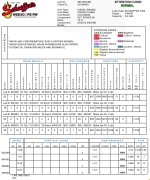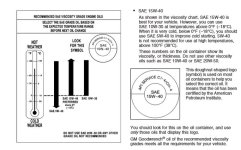CurlyDave
Elite Member
Yup.
5W-40 would be even better than 5W-30.
This is what I use in almost everything diesel, once the warranty has expired. Until then, I put whatever the manufacturer wants in it. After that 5W-40.
For gasoline engines, Mobil 1 EP. Over the years, the weights available have changed, but I always used the widest range available. Although there the routine is a little different. DW drives a lot for her business. Since 2004 we have gotten her a new Toyota Highlander which she has serviced at the dealer for the first 100K miles. Whatever oil they want. This takes about 4 years and she gets another one at that time. I inherit the old one. when I inherit it, I switch to Mobil 1 EP. I drive a lot less than she does, so one oil change per year that I do myself. When I get the 4 year old Highlander I pass on the older one which will typically have about 150k miles. So far, they are all still going strong. A family friend has the 2004, and while the electric windows have needed maintenance, the powertrain has been flawless. Not too bad for over 200k miles.
The 2000 F 150 still runs, although it is pushing 200k miles and has developed a lifter tick. It has had Mobli 1 all its life. As soon as the EP came out i switched to that.
Good oil is cheap compared to engine repairs. Is cheap oil as good as top price oil? I don't know, and for the price difference, I don't intend to find out.
5W-40 would be even better than 5W-30.
This is what I use in almost everything diesel, once the warranty has expired. Until then, I put whatever the manufacturer wants in it. After that 5W-40.
For gasoline engines, Mobil 1 EP. Over the years, the weights available have changed, but I always used the widest range available. Although there the routine is a little different. DW drives a lot for her business. Since 2004 we have gotten her a new Toyota Highlander which she has serviced at the dealer for the first 100K miles. Whatever oil they want. This takes about 4 years and she gets another one at that time. I inherit the old one. when I inherit it, I switch to Mobil 1 EP. I drive a lot less than she does, so one oil change per year that I do myself. When I get the 4 year old Highlander I pass on the older one which will typically have about 150k miles. So far, they are all still going strong. A family friend has the 2004, and while the electric windows have needed maintenance, the powertrain has been flawless. Not too bad for over 200k miles.
The 2000 F 150 still runs, although it is pushing 200k miles and has developed a lifter tick. It has had Mobli 1 all its life. As soon as the EP came out i switched to that.
Good oil is cheap compared to engine repairs. Is cheap oil as good as top price oil? I don't know, and for the price difference, I don't intend to find out.

